It’s a typical grey and overcast afternoon in London when I first meet Thom Evans. We’re in a chic and quirky parlor room at Flemings Mayfair Hotel, and all plans are running smoothly. Thom has been a busy man lately. The rugby-player-turned-model has found much success in the fashion industry, and is now ready to sink his teeth into acting.
Thom Evans is a special person; you get that impression from him almost immediately. He has “it”, the x-factor that you can’t teach. You speak to him and feel there’s a quiet yet strong sense of self. And as soon as our tea and coffee is finished, I sit down to find out more about the man on the rise.
For those who don’t know, where are you from and what was your upbringing like?
I was born in Zimbabwe. My parents live in Portugal. I went to school in England and played for Scotland, so it was a crazy mix.
How was it growing up playing rugby?
It was interesting. I started much later than most other players, but I loved it. There’s such a freedom in the game. I’ve always been fast and being able to use my speed in a sport like rugby was amazing.
How did you first get into rugby?
My dad played a bit of rugby league, which is slightly different but the same element, and my mom was a sprinter from South Africa, so luckily I had decent genes as a starting platform.
What were the biggest differences between amateur rugby and professional rugby? Were there any challenges making the transition?
The biggest difference, for me, was the discipline. Like every other guy, I like to go out on the weekends and enjoy myself, but if you really want to succeed on a professional level, you have to make sacrifices. And I think that goes for every sport. When I made the transition, the going out had to stop.
Would you say sacrifice is a necessary requirement to accomplishing your goals and living your dreams?
Definitely. If you want to make it to the top, you have to make sacrifices. I found it hard when my friends were away on holiday and I was at training camps, but at the end of the day, I wanted to be the best and I felt that particular sacrifice was needed.
READ THE THOM EVANS INTERVIEW IN THE JODIE KIDD EDITION
As a rugby player, what were the highlights for you?
Playing for Scotland for the first time with my brother, Max, was definitely one of them. Obviously representing your country is an amazing thing in itself, but having the opportunity to do that with my brother, who I’m very close with, was the icing on the cake.
I take it your heritage is Scottish?
Yeah, both sets of grandparents are Scottish. So even though I have this crazy sort of upbringing, Scotland is where my roots come from.
What are some of the biggest lessons you learned from playing rugby or any sport in general?
The biggest lesson I learned from rugby was, again, to be very disciplined. You can get away with a lot of things, but if you haven’t done the training, if you haven’t put the dedication into what you eat, it makes a huge difference. I found that even the finest margins were the differences between playing for your country or just playing club rugby.
You’ve been speaking quite a bit on sacrifice and discipline. In my opinion, these are two things previous generations were really able to master. I sometimes look at our generation and think that we’re not always prepared to commit to doing the things we say we’re going to do. What are your thoughts on that?
That’s an interesting point. I think the use of social media, which when I was back playing rugby was non-existent, can be a distraction. I see with a lot of youngsters these days, they’ll finish training and head right back to their phones. It’s obviously the way times are moving, and you can’t fault that, but I feel that without that distraction it was a lot easier to really focus on the goal itself.
In 2010, you suffered from a life-changing injury. What was that moment like for you?
I was playing against Wales in the Six Nations. It was a huge game. We started really well, we were up 15-0. I got an accidental elbow to my lip, which I quickly got stitched up off field. As soon as I got back on the field, I was given the ball, ran through the first line of defense, but kind of ducked my head to protect my lip and in doing so ended up paralyzed from the waist down after being hit. I knew straight away there was something severely wrong. Fortunately the medical team they had on standby, for such a high-profile game, was impeccable and I’ve made a full recovery.
I watched a clip of the game you were injured in and the hit you took looked intense.
Yeah, the best way to describe it was like a power fuse going off in your body. I can honestly say I hope I never experience that ever again.
Obviously rugby was your passion at one time. When you got injured and realised you could no longer play, what was that time in your life like?
It’s really hard, when you work your whole life to get somewhere, and then one day its just taken from you. But as hard as it was to come to terms that I would never play rugby again, I was overwhelmingly grateful that I could still walk and continue to live life to the fullest. So, in many ways, the disappointment of not being able to play was overshadowed by the fact that I could go out into the world and live a very happy life.
How did you decide what the next career steps for you were going to be after your injury?
Well, I spent the first six weeks just incredibly grateful that I would be able to walk again. After that, I was focused on what was next. Acting was always one of the things that I wanted to do, if I wasn’t playing rugby, and I had been approached to model during my athletic career, but its hard to do that with all the black eyes you get. As soon as I was able to function again, I started on the journey pursuing these two goals.
It can be difficult to move on to other career possibilities, when you’re known for doing something completely different. Some men really struggle when their main profession is taken away from them. We sometimes wrap our identities so much in what we do for a living that, when it’s taken away, it can be hard to recognise who we are without it.
Definitely. It certainly wasn’t easy for me and I can see how some guys really struggle in this area. After my injury, I did have people around me who were there to support me psychologically, but looking back, I probably should have gotten help earlier. There are so many mixed emotions and I can definitely see how this is problematic for other men, even more so than it was for myself.
What advice would you give to other men out there, who have lost a dream, passion or even a job and are trying to find that next step?
The best advice I could give is to find that other passion sooner rather than later, because the more time you’re in that unknown territory, it makes it that much harder. When you find a new passion, your mind and body get submerged in it, and it helps to take away the memory of what you’ve lost. I’m a big believer in not looking behind, just looking forward.
You’ve now transitioned from the world of sport into the fashion industry. How has it been, going from one discipline to the next?
The transition to the modeling world was strange for me. I was used to being beaten up on a field, covered in mud, there’s nothing really fancy about that. Now it’s lovely locations, being dressed up and not being beaten up. That being said, I grew to enjoy it. Who wouldn’t?
What are some of your fashion-related goals?
To get the best possible campaigns that are suited to me. Growing up, I used to idolise Mark Wahlberg, when he did the Calvin Klein work. Brands like Armani, which are sporty but still have that strong fashion element, are appealing to me as well.
I’ve briefed myself on a few episodes of your time on Strictly Come Dancing. You’re obviously a very creative and artistic person. Is that something that’s always been in the background for you?
For sure. When I was younger, I was a massive fan of Elvis Presley and Michael Jackson. I used to love watching their dance videos on MTV. I always liked to danced, but I was never trained, so Strictly was good for getting me out of my comfort zone and trying something completely different.
Along with Strictly Come Dancing, this year you were on Celebrity Island With Bear Grylls. Needless to say, it looked tough. Can you tell us what the experience was like?
It wasn’t just tough, it was horrible. Again, it was about putting myself outside of my comfort zone. I feel that’s where you really live and grow. But Bear Grylls was really tough for me, because I love to eat, I love my food, and we just didn’t catch any. In short, I just crumbled away.
So, you’ve been on two national shows in the UK, and the modeling is going very well for you. Career-wise, what are you trying to achieve?
Doing Strictly and Bear Grylls were great, but acting is what I really want to do. I’ve been trying to take any workshops I can in both the States and the UK. I’ve learned a lot and I’m trying to better my craft in anyway that I can. I recognise that I’ve come into the game late, but I’m really passionate to succeed. It’s the same principle as rugby: what you put into it is what you get back. I’m hungry for it.
What would be your ideal role?
Something in a period drama. I love Downtown Abbey and Pride and Prejudice. It would probably be Mr. Darcey, if I had to choose any of them.
It’s clear that your celebrity profile has risen since your rugby days. What challenges, if any, are you experiencing with your life being so public?
It doesn’t really affect me too much. The only annoying this is being linked to women who I’ve never met before. I’m a single man and I read some stories and they’re just completely untrue. Apart from that, its been relatively smooth.
Is there any pressure to perform in either acting or modeling?
Not so much. I’m really enjoying the space I’m in. With acting, its very up and down. You have no idea whether you’re going to land a role or not, but I like that. It’s more reason for me to stay disciplined.
How important do you think confidence is in your profession?
I think confidence is important in every aspect of life. I meet some guys who have so much going for themselves, but still don’t believe in themselves.
Who do you reach out to when you need advice?
My brother. We’re very similar in a lot of ways. Sometimes he can see things that I can’t. Having that person to go to at any time makes such a huge difference. Not many people have that and I really feel for them.
How do you want to be remembered?
As caring and someone who was fun to be around.Honest as well.
If you could have dinner with three people, dead or alive, who would you invite?
Tough one! Muhammad Ali would be one. I met him when I was young. Conor McGregor and Mark Wahlberg.
What’s an important thing you’ve learned about life so far?
Appreciate life. I’m like most guys. Sometimes I can feel down about small and insignificant things, but if you have your health, that’s what I believe truly matters. One thing I learned from being in a hospital bed for six months is to live every day as it comes and really enjoy it. There were people in that hospital room who weren’t as fortunate as me. Appreciate life, because it can be taken away at any time.
Location: Flemings Mayfair
Photographer: Buki Koshoni
Co-producer and set manager: Chiedza Sowah
Stylist: Jack Norman
Wardrobe: Oliver Sweeney
Hair and makeup: Magdalena Mutungi

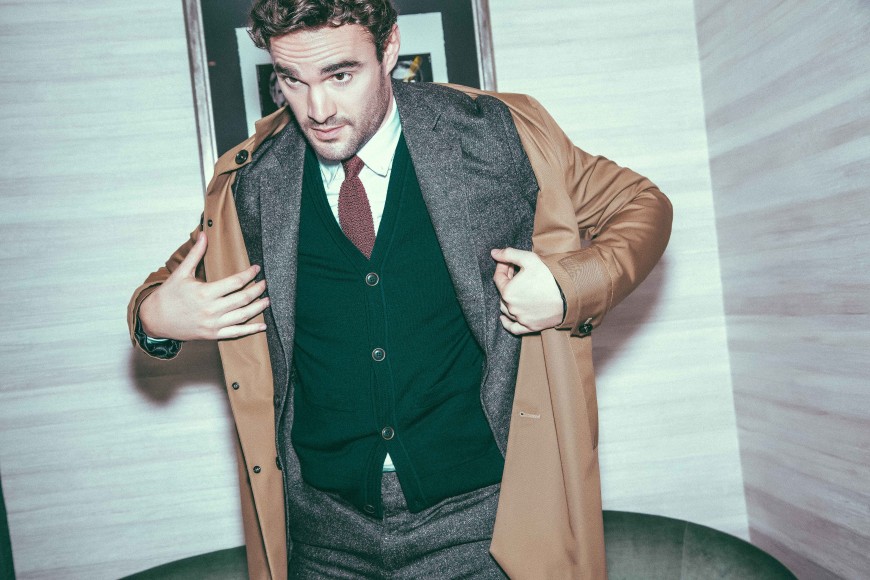
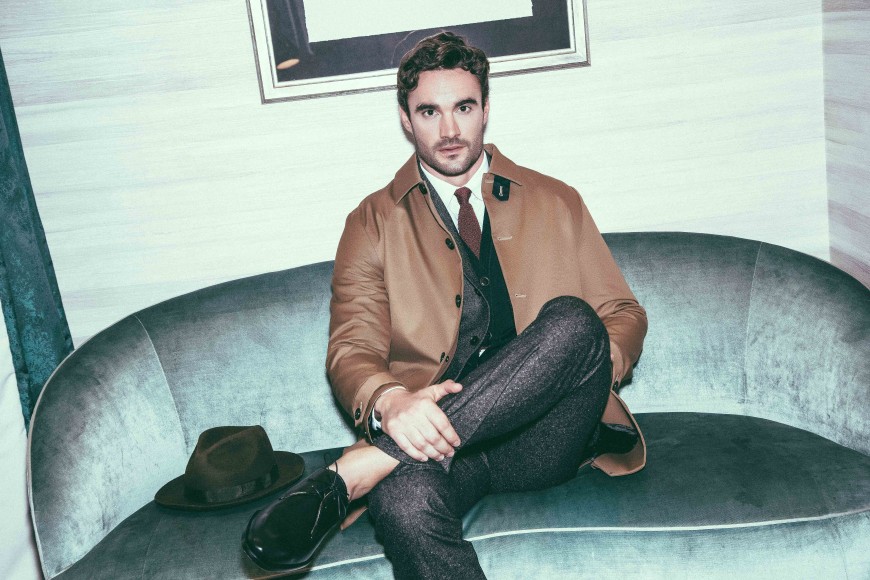
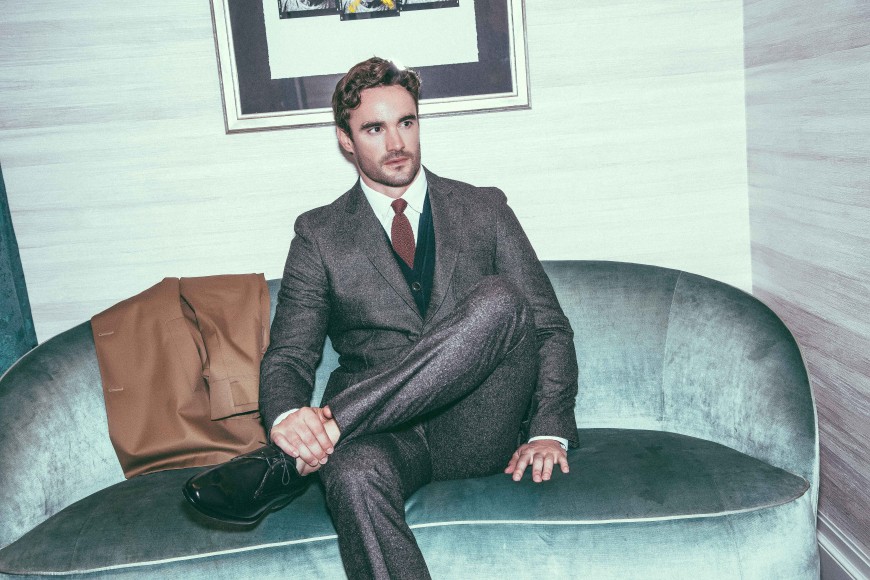
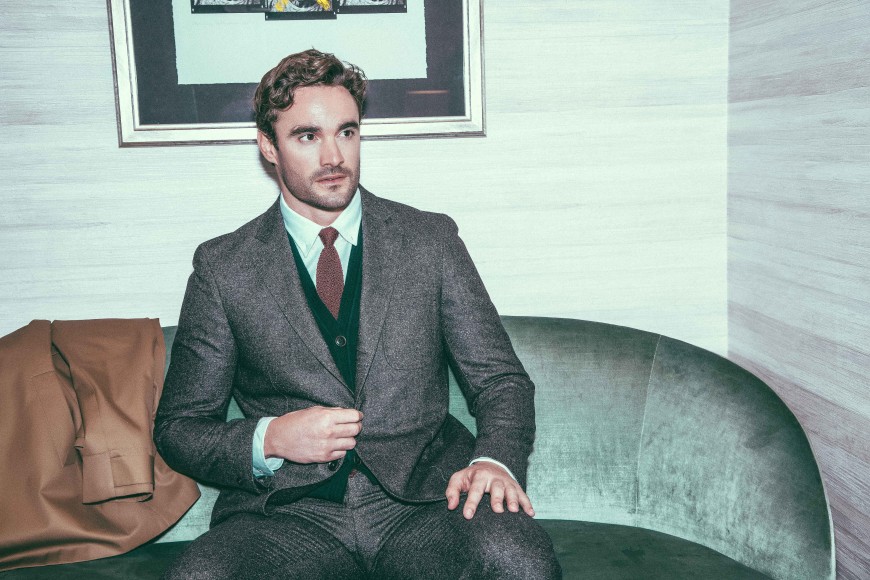
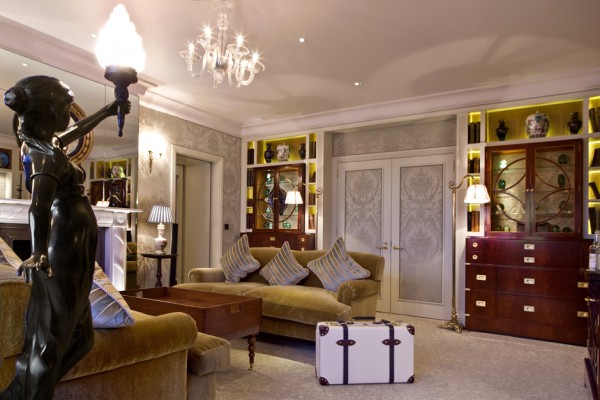
10 Things You Didn't Know about Thom Evans
[…] all need someone we can lean on when we need good, sound advice. For Thom, that person is his older brother. Thom described his relationship with his brother by […]